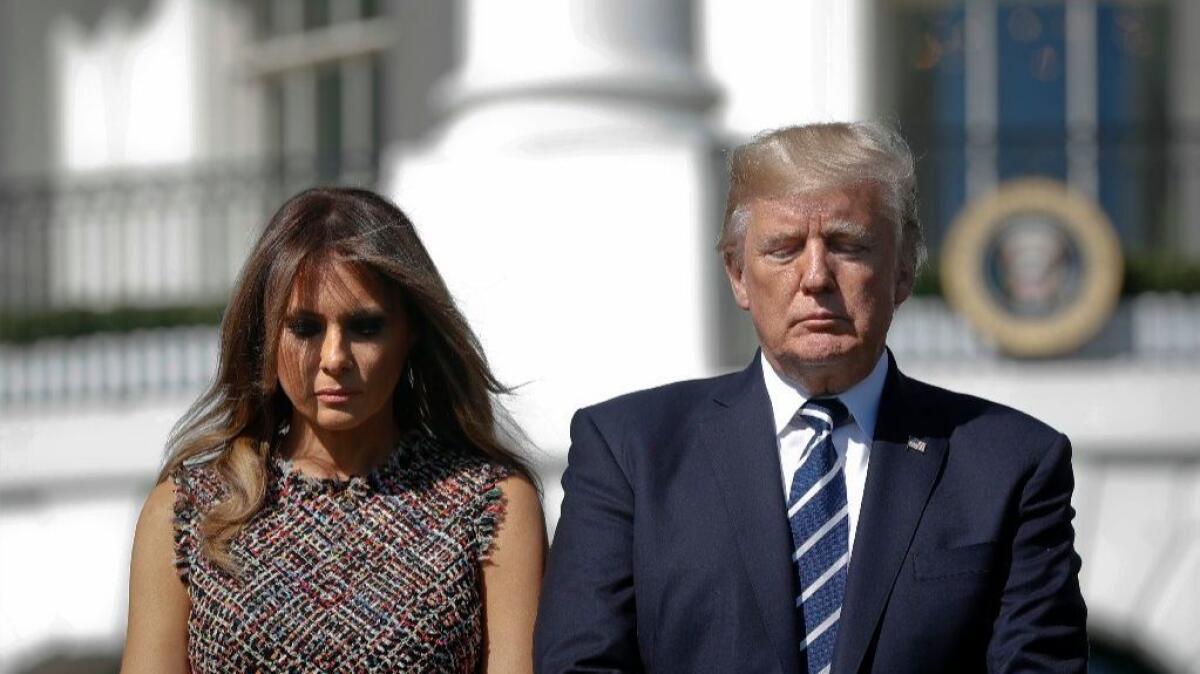Opinion: Did Trump go easy on the Las Vegas shooter by not calling him a terrorist?

- Share via
President Trump is being criticized on the internet — and elsewhere — for not calling the massacre in Las Vegas an act of terrorism. A typical comment on Twitter was: “Trump said the Las Vegas shooter was a sick demented man[;] why not call him what he is a TERRORIST because that what he did he caused Terror.”
But this isn’t the standard definition of terrorism. That term is usually used to refer to mass violence committed to achieve a political or ideological end.
That tracks with legal definitions of terrorism cited by Vox. It’s also notable that the FBI, on its website, has a page devoted to terrorism that refers to Islamic State fighters and “homegrown violent extremists who may aspire to attack the United States from within.” The obvious implication is that “terrorism” requires a political objective.
So far, no political or ideological motive has been identified for Stephen Paddock, who fired into a country music concert Sunday night in Las Vegas, killing at least 59 people and injuring 527 others.
I suspect that the insistence on calling this abominable act terrorism can be explained by two factors. One is just linguistic slippage — for some people, “terrorism” has come to be a synonym for “mass killing.” That seems to be the case with the tweeter quoted above. The shooter caused terror; ergo, he’s a terrorist.
But for others, especially those denouncing Trump for not using the word, this seems to be an extension of a pre-existing claim that Trump in particular and conservatives in general hype Islamic terrorism while ignoring or minimizing violence by right-wing terrorists who happen to be white (and who do fit the traditional definition of a terrorist as someone who commits violence for political ends; Timothy McVeigh, the Oklahoma City bomber, certainly was a terrorist).
There was an echo of the argument in an article by Bradley Burston in the Israeli newspaper Haaretz. Burston wrote:
“This is the man who, as a candidate, demanded, again and again and again, that Barack Obama and Hillary Clinton condemn terrorism by Muslims. ‘When will President Obama issue the words RADICAL ISLAMIC TERRORISM,’ he tweeted after the November, 2015 ISIS attacks in Paris. ‘He can’t say it, and unless he will, the problem will not be solved!
“Now we know for sure [Burston continues]. When it comes to terrorism by white American gun owners, Trump can’t say it. And won’t. He had his chance at a news conference on Monday morning. ‘A gunman opened fire,’ Trump began. A gunman, not a terrorist. It was an act of pure evil.’ Evil — not terrorism. Of course not.”
My problem with this argument is that the people Trump calls radical Islamic terrorists are animated by an ideology; we don’t know that that’s true of Paddock.
Burston has an answer for that, however. He notes that Nevada state law defines “acts of terrorism” as “any act that involves the use or attempted use of sabotage, coercion or violence which is intended to ... cause great bodily harm or death to the general population.” (Andrew McCarthy, a columnist for the National Review, makes the same point about the broad Nevada statute here.)
But that definition of “terrorism” isn’t what most people mean by the term. Certainly it’s not the sort of politically motivated carnage that the Obama administration described as “violent extremism” (angering conservatives who objected to having “Islamic extremism” lumped in with right-wing militia movements).
If it develops that Paddock was indeed motivated by a right-wing ideology, and Trump refuses to call the mayhem he committed terrorism, the president will deserve condemnation. Until then, the criticism seems unfair.
To read the article in Spanish, click here
Follow the Opinion section on Twitter @latimesopinion and Facebook
ALSO
Charles McNulty: If we can’t gather for a concert without fear for our lives, we are doomed
Editorial: The slaughter in Las Vegas is all too familiar, yet Americans refuse to stop it
As initial shock fades, the Las Vegas massacre revives debate on gun control
More to Read
A cure for the common opinion
Get thought-provoking perspectives with our weekly newsletter.
You may occasionally receive promotional content from the Los Angeles Times.







